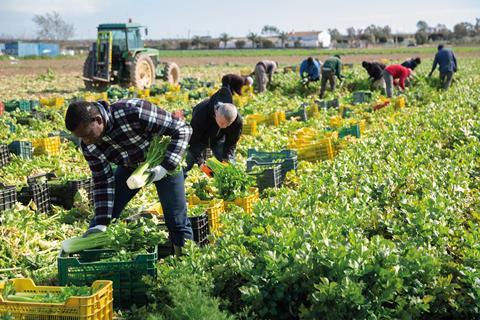Almost half of respondents say they will either leave the ethical audit or sign up to an alternative if forced to pay travel and visa costs of seasonal workers

A survey by the British Growers Association (BGA) has underlined the extent of producers’ concerns about proposed changes to the Sedex Members Ethical Trade Audit (SMETA), which they must pass to supply UK retailers.
Sedex, the global organisation behind the standards, is due to implement the changes in the latest version of the audit, SMETA 7.0, from 10 September 2024.
Almost a quarter (23 per cent) said they intend to resign their membership of Sedex if the changes come into force.
Meanwhile, a further 23 per cent said they would stay in Sedex but sign up to GRASP or another ethical audit instead of SMETA.
That means that almost half (46 per cent) intend to walk away from SMETA 7.0.
Some 37 per cent said they would use SMETA 7.0 – if retail buyers agree that they do not have to meet the ‘employer pays’ and ‘credible living wage’ sections of proposed audit.
And just six per cent said they would remain a member of Sedex and meet the requirements of the new SMETA standard.
Despite claims to the contrary by Sedex, 84 per cent of respondents said they had not been consulted about the SMETA changes.
In recent months, UK grower organisations have made repeated requests for Sedex to pause its proposed changes to SMETA. Growers claim the proposed changes are “unworkable” and cannot be implemented or audited correctly.
At the heart of their frustrations are plans for employers to have to pay the travel and visa costs of seasonal workers.
The BGA survey was conducted in July 2024 and had 169 respondents. All were members of crop associations including British Berry Growers, Asparagus Growers Association, British Onions Producer Association, British Leafy Salads Association, Mushroom Growers Group, Rhubarb Growers Group, Leek Growers Association, and British Apples & Pears.
“We knew there were serious concerns among growers,” said BGA CEO Jack Ward, “but this survey has given the clearest indication yet of what growers may do in the face of several unworkable changes to this audit. Just under a quarter (23 per cent) say they will walk away from Sedex entirely.”
Ward added that the industry must wait for a Defra-funded impact assessment on the employer pays principle to report its findings.
“Before that proper impact assessment has been completed, there is no place for this new SMETA standard,” he stressed.
In the survey, growers also anonymously shared their personal opinions on the proposed changes.
One said: “This proposal threatens to end the viability of produce production in the UK at a time when we should be striving to do produce more.”
Another complained: “As a small grower (under 200 tonnes of produce), my SMETA audit (including follow-up) is going to cost nearly £3,500. I don’t believe the system protects workers; it is a picture in time of an employer’s administration.”
A third expressed concerns that once in the UK, a seasonal worker hired by one farm could potentially switch to working at a different farm at no cost to the new employer.
FPJ gave Sedex the opportunity to respond to the BGA survey, but the company had not replied at the time of publication.



